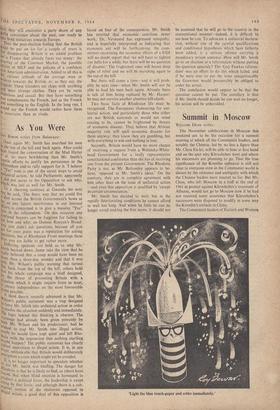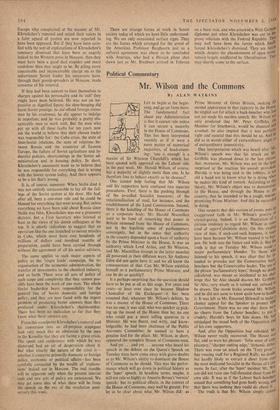Summit in Moscow
WILLIAM DEAN writes:
The November celebrations in Moscow this weekend are to be the occasion for a summit meeting at which all the Communist leaders, and notably the Chinese, led by no less a figure than Mr. Chou En-lai, will be able to hear at first hand and on the spot why Khrushchev went and where his successors are planning to go. That the true significance of the Kremlin upheaval is still not clear to everyone even in the Communist world is shown by the reticence and ambiguity with which the Chinese leaders have reacted so far. But Mr. Chou, who left Moscow in a huff at the end of 1961 in protest against Khrushchev's treatment of Albania, would not go to Moscow now if he had not received some assurance that Khrushchev's successors were disposed to modify in some way the Kremlin's attitude to China.
The Communist leaders of Eastern and Western 'Light the blue touch-paper and retire immediately.' Europe who complained at the manner of Mr. Khrushchev's removal and raised their voices in a faint squeal of protest are now reported to have been appeased. But if they have been satis- fied with the sort of explanations of Khrushchev's summary dismissal that have been so eagerly leaked to the Western press in Moscow, then they must have been a good deal stupider and more credulous than they ought to be. By piling every conceivable and inconceivable charge on to the unfortunate Soviet leader his successors have, through their gossip-spreaders in Moscow. made nonsense of his removal.
If they had been content to limit themselves to charges against his personality and its 'cult' they might have been believed. He was nor an im- pressive or dignified figure; his shoe-banging did harm Soviet prestige; he did offend foreign states- Men by his crudeness; he did appear to indulge in nepotism; and he was probably a pretty dis- agreeable man to work with. But the men who put up with all these faults for ten years now ask the world to believe that their chosen leader was responsible for: the Cuba crisis, the state of Sino-Soviet relations, the state of relations be- tween Russia and the countries of Eastern Europe, the failure of Soviet agriculture and in- dustrial policies, shortcomings in the Soviet ad- ministration and in housing policy. In short, Khrushchev's successors want us to believe that he was responsible for everything that is wrong with the Soviet system today. And there appears to be a lot that's wrong.
• It is, of course, nonsense. When Stalin died it was not entirely unreasonable to lay all the fail- ings of the Soviet system at his door. His had, after all, been a one-man rule and he could be blamed for every thing that went wrong. But, unless everything we have been told about Russia since Stalin was false, Khrushchev was not a gruesome dictator, but a First Secretary who listened at least to the views of his dozen colleagues at the top. It is utterly ridiculows to suggest that an operation like the one launched to mount missiles in Cuba, which must have cost hundreds of millions of dollars and involved months of preparation, could have been carried through without the agreement of all his senior advisers.
The same applies to such major aspects of policy as the 'virgin lands' campaign, the re- organisation of the economic administration, the transfer of investments to the chemical industry, and so forth. These were all acts of policy of such scope and complexity that they cannot pos- sibly have been the work of one man. The whole Soviet leadership bears responsibility for the general line of Soviet domestic and foreign policy, and they are now faced with the urgent problem of producing better answers than they produced under Khrushchev's chairmanship. There has been no indication so far that they know what these answers are.
From this standpoint Khrushchev's removal and his conversion into an all-purpose scapegoat look very much like an admission by the men in the Kremlin that they are facing a grave crisis. The speed and suddenness with which he was dismissed had an air of desperation about it. But What exactly the nature of the crisis is— whether it concerns primarily domestic or foreign policy, economic or political affairs—has been carefully concealed by the wealth of 'explana- tions' leaked out in Moscow. The real trodble will be apparent only when the present interim' ends and new acts of policy are announced. We may get some idea of what these will be from the speech on the eve of the revolution anni- versary this week. There are strange forces at work in Soviet society today of which we have little understand- ing. We see only occasional surface signs. They are the forces which arranged for the arrest of the American Professor Barghoorn just as a cul.tural agreement was about to be concluded with America, who had a Persian plane shot down just as Mr. Brezhnev arrived in Teheran
on a State visit, and who attacked a West German diplomat just when Khrushchev was out to fro' prove relations with the Federal Republic They may well have been the forces which linallY forced Khrushchev's dismissal. They are forces which. despite the abandonment of open terror, remain largely unaffected by 'liberalisation.' TheY may shortly come to the surface.

































 Previous page
Previous page